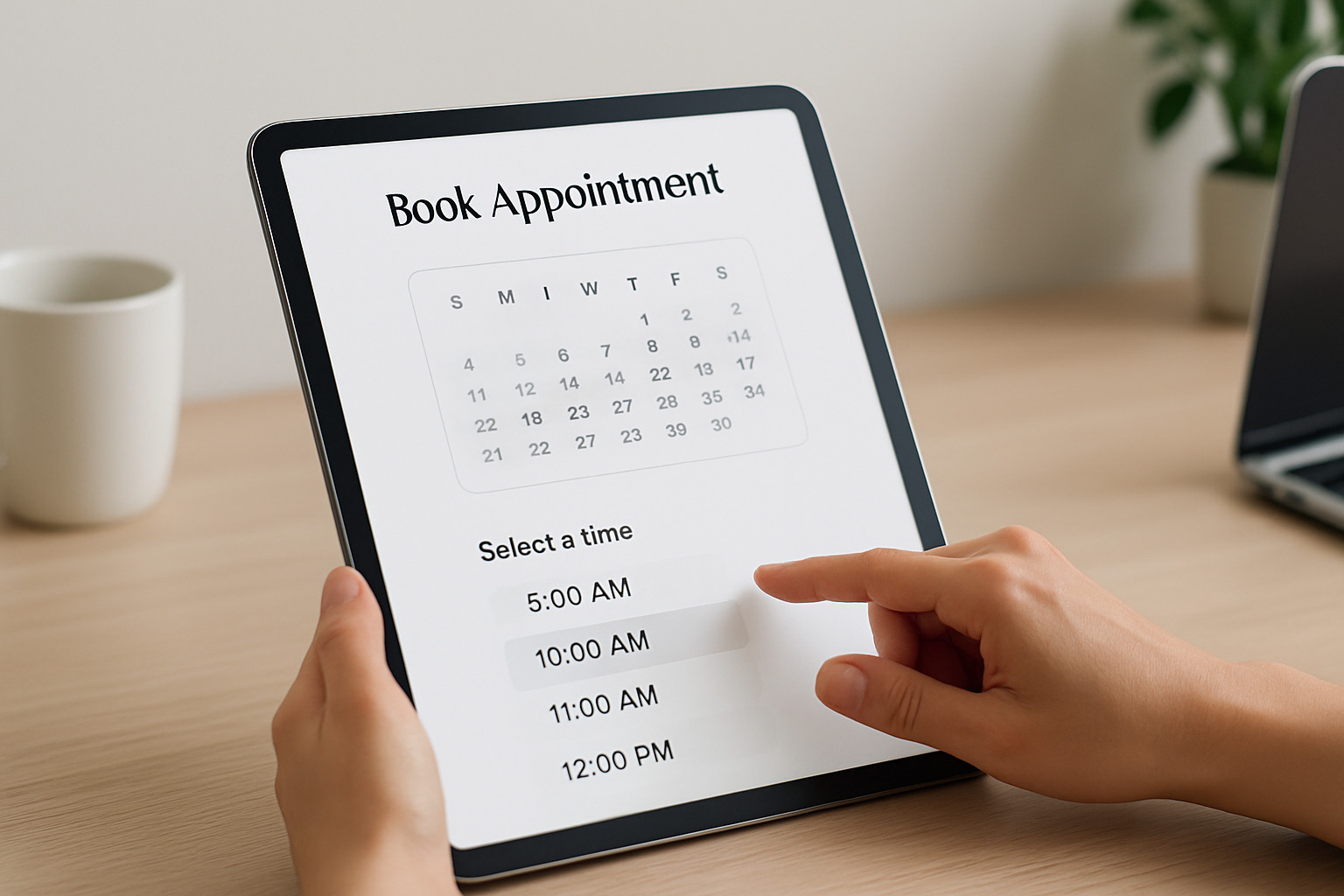Optimising Client & Booking Conversion Through Service-Specific Funnels
By Brendan Byrne - CEO Wednesday, November 19, 2025
Optimising Client & Booking Conversion Through Service-Specific Funnels

In today’s service-driven digital landscape, clients expect more than a quick booking link and a list of offerings. They want clarity, trust, guidance, and a seamless pathway that leads them confidently from first interaction to confirmed appointment. For brands that rely on booked services—whether wellness, beauty, coaching, hospitality, or personalised professional offerings—optimising client conversion isn’t optional. It’s essential.
A well-designed, service-specific funnel can transform the way clients engage with your business. Rather than relying on generic pages that try to speak to everyone, a funnel intentionally educates, nurtures, and guides a customer based on the exact service they’re interested in. When done effectively, these funnels help reduce confusion, build trust, and dramatically increase bookings.
In this article, we’ll break down the strategies that service-based brands can use to enhance booking conversion rates and how service-specific funnels help create a frictionless, highly persuasive customer journey.
Understanding the Client Booking Journey
Before optimising your conversion strategy, you need a clear view of how your ideal client makes decisions. Most customers will follow a version of this pattern:
- Awareness – They discover your brand or service through social media, search, referrals, or ads.
- Interest – They click around your website or explore your offerings.
- Consideration – They compare services, read reviews, and assess if you’re the right fit.
- Decision – They choose to book… or leave.
- Action – They complete the booking.
A strong funnel ensures that each stage feels intentional and supportive. Without it, customers may get overwhelmed, confused, or distracted, leading to unnecessary drop-offs.
Why Generic Conversion Tactics Don’t Work Anymore
Many businesses rely on broad, one-size-fits-all approaches:
- A single “Book Now” button
- A generic services page with limited detail
- A contact form that requires manual follow-up
- No clear explanation of what the customer is actually getting
While these methods can work, they don’t create confidence or urgency. In service-based industries, clients don’t just buy a product—they buy an experience, a result, and trust.
If the pathway to booking doesn’t reflect that trust and clarity, they hesitate.
This is where service-specific funnels come in.
What Are Service-Specific Funnels?
A service-specific funnel is a curated pathway designed for one single service.
For example:
- A booking funnel for a facial treatment
- A funnel for a coaching package
- A funnel for a photography shoot
- A funnel for a retreat, consultation, or course
- A funnel for product + service bundles (like after-care packages)
Each funnel is customised with messaging, visuals, proof, FAQs, and booking steps tailored to the exact service being offered.
This strategy dramatically boosts conversion for one important reason:
People convert faster when they feel personally guided.
When your funnel speaks directly to their problem, goal, or service need, hesitation lowers and action increases.
Key Elements of a High-Converting Booking Funnel
Below are the core elements every effective service-specific funnel should include:
1. Strong Service Positioning & Clear Value Proposition
Your customers need to understand:
- What the service is
- Who it’s for
- What problem it solves
- What outcome they can expect
- Why your brand is the best choice
Avoid vague descriptions. Be specific, results-focused, and benefit-driven.
Example: Instead of “Deep Cleansing Facial,” use:
“Deep Cleansing Facial for congested, acne-prone skin—designed to detox pores, boost clarity, and calm inflammation in just one session.”
When positioning is clear, conversion becomes easier.
2. Visual Proof & Experience Previews
Service-based clients rely heavily on visual trust cues.
Use:
- Before & after images
- Client results
- Behind-the-scenes clips
- Session walkthroughs
- Practitioner introductions
This builds emotional trust and reduces uncertainty.
3. Social Proof: Reviews & Testimonials
Highlight real experiences:
- Customer reviews
- Video testimonials
- Screenshots from messages
- Star ratings
- Repeat client mentions
Social proof reassures clients that they’re choosing a reputable provider.
4. Transparent Service Details & Expectations
Your funnel should answer every question the client has before they ask, such as:
- How long the service takes
- What to expect during the session
- Pre-appointment instructions
- Aftercare instructions
- Required forms
- What results they can expect
- Pricing & inclusions
When everything is transparent, clients feel comfortable moving forward quickly.
5. A Frictionless Booking Experience
Once your funnel convinces the client, they should encounter zero friction when booking.
Optimise:
- Calendar availability
- Clear time slots
- Simple booking forms
- Mobile-friendly layout
- Secure payment integration
- Automated reminders
If the booking process takes more than a minute or two, drop-offs increase.
6. Follow-Up Automation & Nurturing
If a customer doesn’t book immediately, your funnel can still convert them through:
- Abandoned booking follow-up emails
- SMS reminders
- Incentive-based nudges
- Educational sequences
- Product recommendations (when relevant)
Automation ensures you don’t lose warm leads simply because they weren’t ready in the moment.
=====
How Funnels Support Product-Linked Services
If your brand offers both services and products—such as supplements, skincare, wellness kits, or digital resources—service-specific funnels allow you to blend them naturally.
For example, if you offer a skin consultation, your funnel might recommend:
- A serum that supports the aftercare
- A detox pack that enhances results
- A topical addition that accelerates healing
This approach not only boosts revenue but strengthens the client’s outcome and overall experience.
A service funnel for any skin-related treatment could include a link to your product page, like:
https://mudorganics.com.au/products/detox-cleanse
This allows clients to understand how products improve their service results—enhancing trust and increasing cart value.
Measuring & Improving Conversion Rates
Optimisation is an ongoing process. Track the following metrics for each service funnel:
- Page visits
- Time spent on page
- Click-through rate to booking page
- Abandoned booking rate
- Completed bookings
- Revenue per client
- Funnel drop-off points
Use these insights to refine messaging, visuals, booking flow, and automation. Even a small improvement—like reducing form fields or clarifying one paragraph—can produce meaningful conversion increases.
Common Mistakes to Avoid
Here are the most frequent barriers that damage booking conversion:
❌ Using the same funnel for every service
❌ Not offering enough detail
❌ Overloading clients with too much text
❌ No reviews or social proof
❌ Clunky or confusing booking pages
❌ Poor mobile experience
❌ Lack of follow-up for abandoned bookings
❌ Not integrating products that support the service
Fixing these issues alone can significantly increase conversions.
Conclusion: The Future of Service Booking is Personalised & Funnel-Driven
Optimising client conversion isn’t about being pushy—it’s about clarity, guidance, and trust. Service-specific funnels give potential clients a personalised pathway that makes booking feel obvious and easy.
When paired with strong positioning, visual proof, transparent details, and frictionless booking systems, funnels can dramatically increase both conversion rates and client satisfaction.
Businesses that embrace these personalised booking funnels are the ones that consistently see more bookings, higher revenue, and stronger long-term loyalty.


